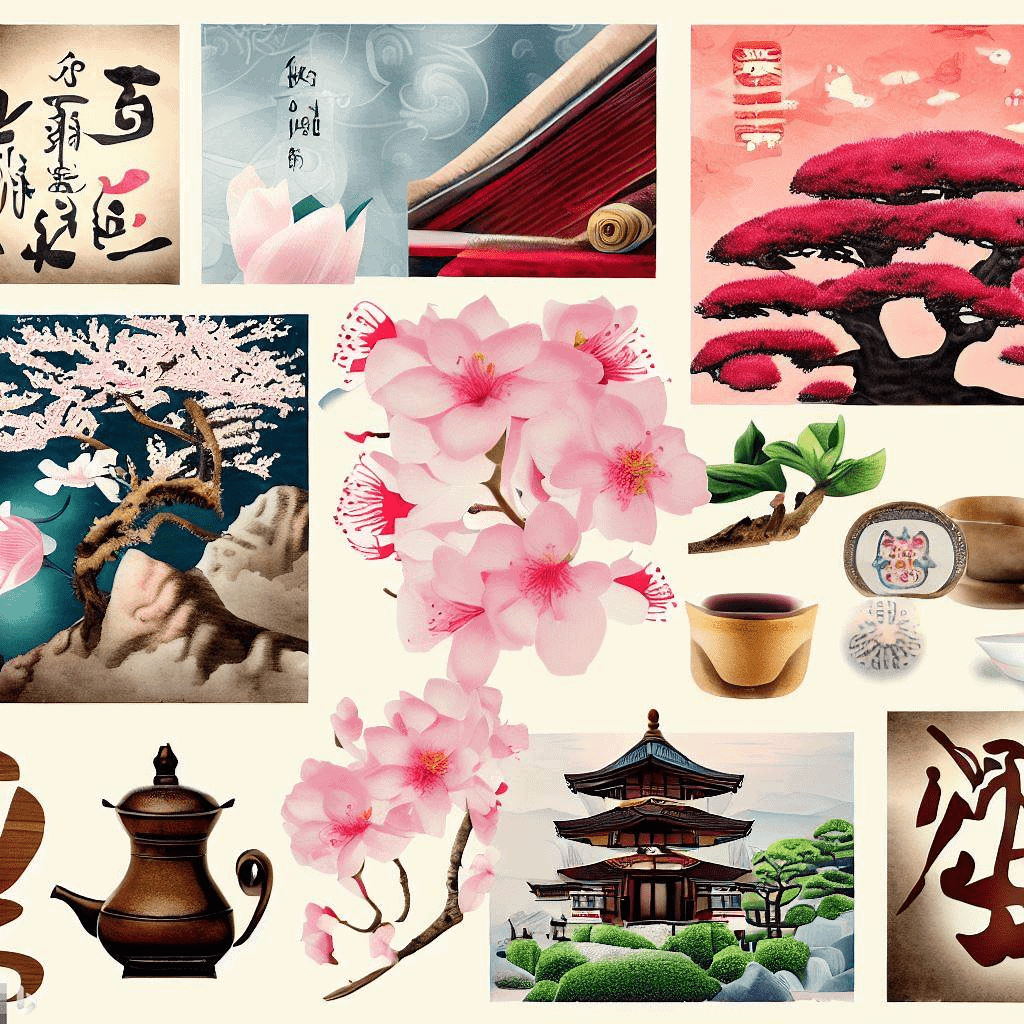7 Japanese Concepts: Exploring the Depth of Japanese Culture

Introduction
Japan is a country renowned for its rich cultural heritage and fascinating traditions. In addition to sushi, cherry blossoms, and anime, Japan offers valuable philosophies and concepts that can significantly enhance our way of life. While most people are familiar with popular Japanese concepts like Zen and mindfulness, there are several lesser-known yet equally valuable principles that promote personal growth and well-being. In this article, we will explore 7 such concepts: Ikigai, Shikata Ganai, Wabi Sabi, Gaman, Oubaitori, Kaizen, and Shu Ha Ri.
1. Ikigai: Finding Your Purpose

Ikigai refers to the concept of finding your “reason for being” or your purpose in life. It is a combination of what you love, what you are good at, what the world needs, and what you can be paid for. Discovering your Ikigai involves deep introspection and self-reflection, allowing you to align your passions and talents with meaningful work. By living in accordance with your Ikigai, you can experience a sense of fulfillment and contentment in your everyday life.
2. Shikata Ganai: Accepting the Unchangeable
Shikata Ganai translates to “it can’t be helped” or “accepting the unchangeable.” This concept emphasizes the importance of accepting and adapting to situations that are beyond your control. Rather than wasting energy on things you cannot change, Shikata Ganai encourages you to focus on finding peace and making the best of what life throws at you. By embracing this philosophy, you can cultivate resilience and reduce unnecessary stress and frustration.
3. Wabi Sabi: Embracing Imperfections
Wabi Sabi is a concept that celebrates the beauty of imperfections and transience. It teaches us to find beauty in the natural cycle of growth and decay and to appreciate the simplicity and authenticity of things. By embracing the imperfect and accepting the transient nature of life, Wabi Sabi encourages us to let go of unrealistic ideals and find joy in the present moment.
4. Gaman: Enduring Difficulties with Patience

Gaman is a Japanese virtue that emphasizes the importance of endurance and perseverance in the face of challenges. It teaches us to maintain composure, patience, and dignity during difficult times. Gaman encourages us to face adversity with strength and resilience, allowing us to navigate life’s obstacles with grace and determination.
5. Oubaitori: Enjoying the Moment

Oubaitori, which translates to “chase after a butterfly,” represents the idea of fully immersing oneself in the present moment and enjoying the beauty of fleeting experiences. In our fast-paced and hectic lives, Oubaitori reminds us to slow down, appreciate the little joys, and find delight in simple pleasures. By savoring the present moment, we can cultivate mindfulness and develop a greater appreciation for the richness of life.
6. Kaizen: Continuous Improvement
Kaizen is a philosophy of continuous improvement and self-refinement. It encourages small, incremental changes that lead to significant progress over time. The concept of Kaizen focuses on making continuous efforts to refine and enhance various aspects of your life, including personal growth, relationships, and work. By embracing Kaizen, you can develop a growth mindset and strive for constant self-improvement.
7. Shu Ha Ri: Mastery through Stages

Shu Ha Ri is a concept that represents the stages of learning and mastery. “Shu” refers to the beginner stage, where one follows and adheres strictly to the teachings and rules. “Ha” represents the intermediate stage, where one starts to question and explore beyond the established rules. Finally, “Ri” signifies the stage of mastery, where one transcends the teachings and develops a deep understanding and personal expression of the principles. Shu Ha Ri emphasizes the importance of discipline, continuous learning, and personal growth on the path to mastery.
Conclusion
Exploring the lesser-known Japanese concepts discussed in this article can greatly contribute to leading a more fulfilling and meaningful life. Whether it’s finding your Ikigai, accepting the unchangeable with Shikata Ganai, embracing imperfections through Wabi Sabi, enduring difficulties with Gaman, enjoying the present moment with Oubaitori, striving for continuous improvement through Kaizen, or progressing through stages of mastery with Shu Ha Ri, these concepts offer valuable insights and practical wisdom.
By incorporating these concepts into your daily life, you can cultivate a greater sense of purpose, resilience, gratitude, and personal growth. Embrace the wisdom of these Japanese concepts and embark on a journey to live a better, more meaningful life.
FAQs
1. Are these concepts unique to Japan?
Yes, these concepts have deep roots in Japanese culture and philosophy.
2. Can I apply these concepts outside of Japan?
Absolutely! These concepts are universal and can be applied by anyone, regardless of their cultural background.
3. How can I discover my Ikigai?
Finding your Ikigai requires self-reflection and introspection. Explore your passions, talents, values, and what brings you joy and fulfillment.
4. Is it possible to practice Shikata Ganai without feeling resigned?
Shikata Ganai is about accepting the unchangeable while maintaining a positive outlook. It’s not resignation but rather focusing on what you can control and finding peace in difficult situations.
5. Can I experience Wabi Sabi in everyday life?
Yes, you can practice Wabi Sabi by appreciating the beauty in imperfections, embracing simplicity, and finding joy in the present moment.





